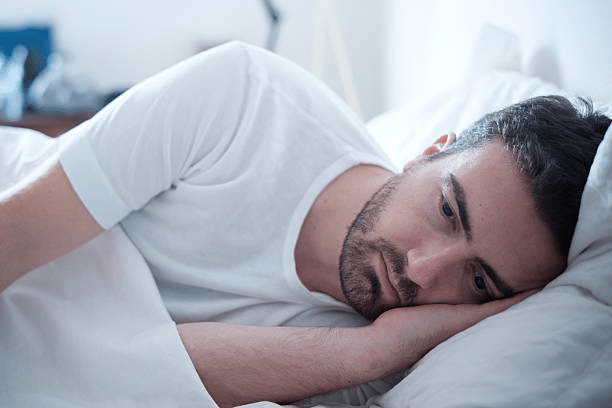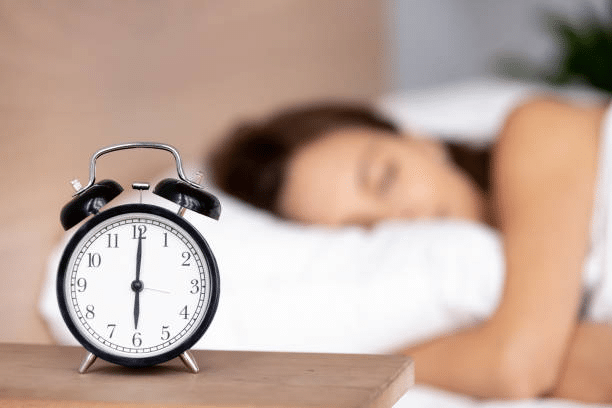If you’ve ever had insomnia, you may wonder how to fall asleep faster. Even if your unique traits and requirements might have trouble sleeping, using a few tried-and-true techniques may make it easier for you to sleep soundly to have a good night’s sleep.
The secret to falling asleep faster is to relax. Relaxation gets your body and mind ready to fall asleep. We’ll talk about a few all-natural techniques for improving sleep, such as guided imagery, breathing exercises, and meditation to add to your healthy sleep habits.
Sleep Onset Latency: How Long Should It Take To Fall Asleep?

The time it takes to fall asleep is called sleep latency or sleep onset latency. Typically, a good sleep latency lasts between 10 and 20 minutes. This period is not the time spent getting ready for bed, such as taking a shower, brushing your teeth, or doing some meditation. Instead, it is the time spent attempting to fall asleep after you are in bed.
According to the National Sleep Foundation, good sleep duration is defined as 15 minutes or less, reasonably average sleep duration is defined as 16 to 30 minutes, and insufficient sleep duration is defined as 45 minutes or more. Sleep latency that is very lengthy or short may point to problems with sleep quality.
The Impact Of Sleep Latency
If it takes you fewer than ten minutes to fall asleep, you could be sleep deprived. However, waiting too long to fall asleep is seen as an indication of insomnia and could signify unhealthful rest.
The quantity of time spent sleeping as opposed to lying in bed, which is a measure of the quality of sleep, is also impacted by sleep latency. Longer sleep latency durations are, by definition, associated with less restful sleep.
Many individuals with insomnia have trouble turning off their anxieties when they attempt to go to sleep. A good sleeper may swiftly shift at night from ordinary wakeful thought to a calmer, more image-focused state.
In contrast, someone with insomnia could stay up all night making plans or addressing problems, which keeps them from completely unwinding. Similarly, persons who struggle to fall asleep often have more pronounced physical symptoms of stress, such as stiff muscles, a higher body temperature, and a faster pulse.
Natural Ways To Fall Asleep Quickly And Improve Your Sleep Quality
Typically, natural ways for falling asleep concentrate on minimizing nighttime stress and producing a calmer state known as the relaxation response. Deep breathing and complete concentration are standard components of relaxation therapies. These approaches may aid in reducing pain, tension, anxiety, and other illnesses that might interfere with sleep, according to some studies; however, further investigation is required.
Set aside time for relaxing activities that suit your sleep patterns as part of your nighttime sleep routine. To get the necessary amount of sleep for your age group, remember to start your bedtime ritual early enough.
1. Unlocking The Secret To Achieving Sleep In 2 Minutes
Military personnel sometimes have erratic schedules and unfavorable sleeping environments, which might interfere with their sleep cycles. The military approach was created to assist troops in falling asleep in two minutes. The following stages are part of this process:
- Take a comfortable stance and relax your brow, eyes, jaw, lips, and other facial muscles.
- Drop your shoulders first, then let your arms hang at your sides.
- Start inhaling deeply to relax your chest.
- Start relaxing your lower body by beginning at your hips and moving down each leg to your feet.
- To calm your thoughts, picture a serene environment, such as a picturesque landscape, a tranquil lake, or a warm room in your house. Recognize any distracting ideas you may have and try to get over them. It may be difficult to visualize; if this is the case, repeat a short phrase to yourself, such as “don’t think,” to help you focus.
2. Block Out Noisy Surroundings
It might be challenging to fall asleep fast and peacefully in a loud environment. You may discover that relaxing music relaxes you and blocks out outside noises, decreasing unwanted or unpleasant sounds.
To establish a habit for yourself, think about making a playlist that corresponds with the optimum 10 to 20-minute sleep latency window and listening to it each night. Some individuals also promote the advantages of white noise for sleep if they find music too distracting.
3. Taking A Warm Bath
As you sleep, your body temperature fluctuates. When you lay down, your body cools down, and when you get up, it heats up.
You can have trouble falling asleep if your room is too warm. It could be beneficial to set your thermostat to a cold setting of 60–67°F (15.6–19.4°C). Find the most comfortable temperature for you since everyone has different tastes.
A warm bath or shower may speed up the body’s temperature variations. This may prompt your brain to sleep when your body cools down.
According to one research study, having a hot bath or shower before bed may enhance the efficiency and quality of your sleep. Sleep efficiency is the amount of time you spend sleeping in a bed instead of lying awake.
One to two hours before tonight, those who had baths or showers that were between 104°F and 108.5°F (40.0°C and 42.5°C) reported beneficial outcomes. Many said it improved sleep even with little showers or baths of just ten minutes. These results are encouraging, but further study is required.
4. Establish A Sleep Schedule

Many individuals find that creating a sleep regimen makes it simpler for them to go to sleep. Your body has its own internal control mechanism known as the circadian rhythm.
It receives signals from this internal clock to feel awake throughout the day but drowsy at night. Your internal clock can maintain a regular schedule if you get up and go to bed at the exact times every day.
It will be simpler to go to sleep and get up at the same time each day after your body has become used to the pattern. Getting 7 to 9 hours of sleep per night is also crucial. Adults should sleep for an ideal period.
Last but not least, allow yourself 30 to 45 minutes each evening to unwind before bed. Your body and mind may unwind and be ready for sleep.
5. Mindfulness Meditation
You could fall asleep more quickly if you use meditation to sleep peacefully. Particularly mindfulness meditation has shown potential outcomes for enhancing sleep.
The fundamental principles of mindfulness meditation are relaxing through paying attention to the present and letting go of judgment. When used before bed, mindfulness techniques may lessen daydreaming and make it simpler to let go of unpleasant feelings before rest.
According to a 2014 research, mindfulness meditation may help persons with chronic insomnia sleep better and sleep less in bed. When using meditation techniques for the first time, you could discover that relaxing takes longer.
You might start to relax more easily and go to sleep after you become used to the procedure. See your doctor before beginning if you have a history of trauma or if you find that meditation triggers unpleasant or challenging thoughts.
Using essential oils for aromatherapy, regular exercise, having a warm bath or shower before bed, and journaling are other ways to reduce the time it takes to fall asleep.
6. Use a Progressive Muscle Relaxation
To relieve physical tension, progressive muscle relaxation employs breathing methods and muscular contraction and release. Progressive muscle relaxation encourages relaxation by progressively going through all main muscle groups. The following stages are part of this process:
- Close your eyes as you lay in bed and start taking calm, deep breaths.
- Ten seconds later, tense your facial muscles. Breathe several times deeply to release the stress.
- After that, ten seconds later, relax your shoulder muscles. Deeply inhale and exhale.
- Start with your shoulders and work your way down to your feet by repeating this action for all other muscle groups in your body. Any pain-filled places should be left out.
7. Avoid Daytime Napping
People with insomnia sometimes feel drowsy throughout the day due to inadequate sleep at night, which often results in daytime naps. Short naps have been associated with increased alertness and well-being, although there are conflicting views on how naps affect overnight sleep.
According to some research, older persons who napped regularly had a worse sleep at night, more depressive symptoms, and less physical activity overall. Additionally, compared to those who seldom rested, they were more likely to be overweight. Recent research on high school students found that midday naps reduced the time spent sleeping and the quality of that sleep.
8. Have A Morning Exercise

Healthy sleep is often seen to be a benefit of physical exercise. By increasing serotonin synthesis in the brain and lowering cortisol levels, exercise may lengthen and improve sleep quality.
However, it’s crucial to maintain a moderate-intensity exercise program and avoid going too. Poor sleep has been connected to excessive training. The time of day you work out is also significant. Functional exercise in the morning is preferable to working out later for better sleep.
Therefore, engaging in light to moderate activity first thing in the morning might significantly enhance the quantity and quality of your sleep.
Get active by engaging in things like:
- Running
- Hiking
- Cycling
- Tennis
9. Have a Quality Mattress And Bedding
A comfortable mattress and bedding may significantly affect the quantity and quality of sleep. It has been shown that a medium-firm mattress improves sleep quality, reduces sleep disruptions, and eases sore muscles. Your pillow’s quality is also essential.
It might affect:
- Neck bend
- Temperature
- Comfort
Little research shows that orthopedic pillows may provide better sleep than feather or memory foam pillows. A weighted blanket may help you sleep better and decrease bodily tension.
Last but not least, the material of the clothing you wear to bed may impact how well you sleep. You must dress comfortably in materials that maintain a comfortable body temperature all night.
10. Use Aromatherapy
Essential oils are used in aromatherapy. People who struggle to fall asleep often use it since it may help them relax. Aromatherapy helps enhance sleep quality, according to a comprehensive evaluation of 12 trials.
Popular fragrances that promote sleep include:
- Lavender
- Rose damask
- Peppermint
Lemon and orange essential oil mixes were equally successful in enhancing sleep quality. Although there are several methods to utilize essential oils, inhalation aromatherapy is the focus of much sleep research. It is helpful to use an essential oil diffuser to fill your bedroom with calming aromas that promote sleep.
11. Stay Away From Caffeine Before Bedtime
People often use caffeine to combat weariness and increase attentiveness. It may be found in such meals and drinks as:
- Chocolate
- Coffee
- Sodas
- Energy beverages
Your ability to fall asleep and stay asleep for a long time may suffer due to this stimulant. Although everyone reacts to caffeine differently, it is advised to avoid taking any caffeine at least 6 hours before bed.
You might instead sip on a calming beverage like chamomile tea. It has been shown to support relaxation and sleep. Magnolia and passion flower teas are other sedatives.
12. Consider Using Natural Sleep Aids
You may experience faster sleep if you use certain substances. They have been shown to promote sleep by increasing the synthesis of hormones stimulating sleep or reducing brain activity.
Among the supplements that may aid with sleep are:
GABA (gamma-aminobutyric acid)
The brain produces the chemical GABA. It may promote relaxation of the central nervous system and block certain transmitters. It is advised to take doses between 250 and 500 mg and no more than 1,000 mg.
Melatonin
The body produces the hormone melatonin naturally, but you may also take it as a supplement to help control your sleep. Most people typically go to bed at about 8 or 9 p.m.; therefore, doses of 0.5 to 5 mg given two hours before that time may enhance sleep quality.
L–theanine
An amino acid having sedative qualities is called L-theanine. Although it hasn’t been shown to promote sleep, it could aid in relaxing. Daily doses of 400 mg are beneficial.
5-HTP (5-hydroxytryptophan)
Serotonin, an amino acid related to sleep control, is produced more quickly thanks to the amino acid 5-HTP. For the treatment of insomnia, dosages up to 600 mg per day, administered either once daily or in divided doses, are helpful.
Magnesium
The sleep-related neurotransmitters are assisted in their activation by magnesium. It has been shown that doses of up to 500 mg daily enhance sleep. It has to be consumed with meals.
For those seeking to enhance their night’s rest, our collection of CPAP accessories might just be the subtle addition you need. Explore Resway and discover how the right tools can quietly improve your sleep quality.




